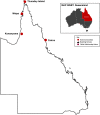Towards best practice during COVID-19: A responsive and relational program with remote schools to enhance the wellbeing of Aboriginal and Torres Strait Islander students
- PMID: 38603315
- PMCID: PMC9816620
- DOI: 10.1177/01430343221137717
Towards best practice during COVID-19: A responsive and relational program with remote schools to enhance the wellbeing of Aboriginal and Torres Strait Islander students
Abstract
Purpose: From 2018, the Schools Up North (SUN) programme worked with three remote Australian schools to enhance their capability and resilience to support the wellbeing and mental health of Aboriginal and Torres Strait Islander students and staff. This paper explores the implementation of SUN during the first two years of COVID-19 (2020-2021). Method: Using grounded theory methods, school staff, other service providers and SUN facilitators were interviewed, with transcripts and programme documents coded and interrelationships between codes identified. An implementation model was developed. Results: The SUN approach was place-based, locally informed and relational, fostering school resilience through staff reflection on and response to emerging contextual challenges. Challenges were the: community lockdowns and school closures; (un)availability of other services; community uncertainty and anxiety; school staff capability and wellbeing; and risk of educational slippage. SUN strategies were: enhancing teachers' capabilities and resources, facilitating public health discussions, and advocating at regional level. Outcomes were: enhanced capability of school staff; greater school-community engagement; student belonging and engagement; a voice for advocacy; and continuity of SUN's momentum. Conclusions: The resilience approach (rather than specific strategies) was critical for building schools' capabilities for promoting students and staff wellbeing and provides an exemplar for remote schools globally.
Keywords: First Nations; Indigenous; grounded theory; mental health promotion; remote.
© The Author(s) 2022.
Conflict of interest statement
The author(s) declared no potential conflicts of interest with respect to the research, authorship, and/or publication of this article.
Figures
Similar articles
-
The Childhood Resilience Study: Resilience and emotional and behavioural wellbeing experienced by Australian Aboriginal and Torres Strait Islander boys and girls aged 5-9 years.PLoS One. 2024 Apr 16;19(4):e0301620. doi: 10.1371/journal.pone.0301620. eCollection 2024. PLoS One. 2024. PMID: 38626131 Free PMC article.
-
Diversity in eMental Health Practice: An Exploratory Qualitative Study of Aboriginal and Torres Strait Islander Service Providers.JMIR Ment Health. 2017 May 29;4(2):e17. doi: 10.2196/mental.7878. JMIR Ment Health. 2017. PMID: 28554880 Free PMC article.
-
Exploring self-determined solutions to service and system challenges to promote social and emotional wellbeing in Aboriginal and Torres Strait Islander people: a qualitative study.Front Public Health. 2023 Sep 22;11:1206371. doi: 10.3389/fpubh.2023.1206371. eCollection 2023. Front Public Health. 2023. PMID: 37809004 Free PMC article.
-
A rapid review to inform the policy and practice for the implementation of chronic disease prevention and management programs for Aboriginal and Torres Strait Islander people in primary care.Health Res Policy Syst. 2024 Mar 21;22(1):34. doi: 10.1186/s12961-024-01121-x. Health Res Policy Syst. 2024. PMID: 38509612 Free PMC article.
-
Exploring the Reported Strengths and Limitations of Aboriginal and Torres Strait Islander Health Research: A Narrative Review of Intervention Studies.Int J Environ Res Public Health. 2023 Feb 23;20(5):3993. doi: 10.3390/ijerph20053993. Int J Environ Res Public Health. 2023. PMID: 36901001 Free PMC article. Review.
Cited by
-
Resilience to COVID-19 challenges: Lessons for school psychologists serving school-attending youth with experiences of marginalization.Sch Psychol Int. 2023 Apr;44(2):123-134. doi: 10.1177/01430343231151591. Epub 2023 Jan 31. Sch Psychol Int. 2023. PMID: 38603445 Free PMC article.
References
-
- Australian Bureau of Statistics. (2017). Census of population and housing - counts of aboriginal and Torres Strait Islander Australians. Canberra: ABS.https://www.abs.gov.au/statistics/people/aboriginal-and-torres-strait-is...
-
- Australian Government. (2020). Closing the gap targets and outcomes. Canberra: National Cabinet and National Federation Reform Council. https://www.closingthegap.gov.au/everyone-enjoys-long-and-healthy-lives
-
- Australian Institute of Health and Welfare. (2018). Aboriginal and Torres Strait Islander adolescent and youth health and wellbeing 2018: in brief. AIHW.
-
- Australian Institute of Health and Welfare. (2022). Rural & remote Australians. Canberra: Australian Government. https://www.aihw.gov.au/reports-data/population-groups/rural-remote-aust...
LinkOut - more resources
Full Text Sources


